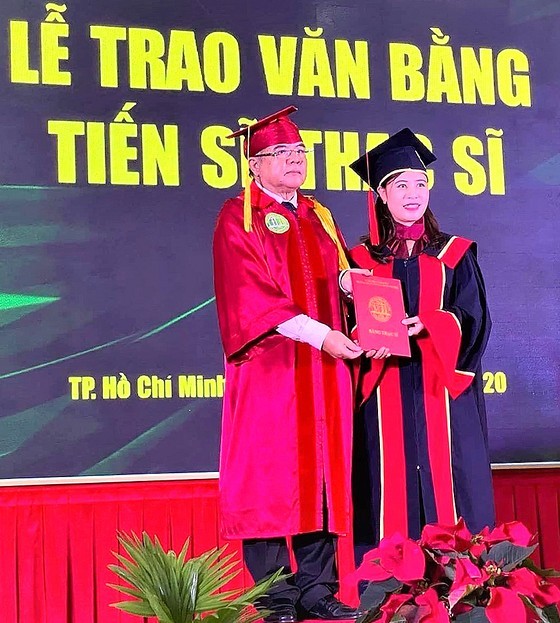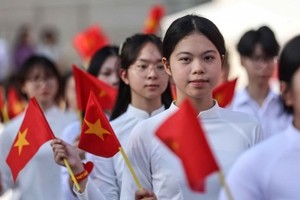 |
Assoc. Prof. Dr. Huynh Thanh Hung, Acting Rector of HCMC Nong Lam University, is delivering graduation degrees to doctorates and masters |
Since 2018, when Prof. Mai Hong Quy retired from her rector position, HCMC University of Law has not welcomed any new rector, and the university leader now is Assoc. Prof. Dr. Tran Hoang Hai, its Vice Rector. Facing a similar case is HCMC Nong Lam University, which has been under the management of its Acting Rector – Assoc. Prof. Dr. Huynh Thanh Hung since January 2021.
The situation in HCMC University of Technology and Education is even worse. In May 2021, Assoc. Prof. Dr Do Van Dung resigned from the rector position, and the University Board elected Assoc. Prof. Dr. Nguyen Truong Thinh into this position. However, the Education and Training Ministry did not approve the proposal; instead, it assigned Assoc. Prof. Dr. Le Hieu Giang to take over the position until now.
Yet the most complicated case is the story of HCMC University of Medicine and Pharmacy. From the time former Rector Tran Diep Tuan was moved to the position of President of the University Board in July 2020, it had not had any rector but only a vice-rector as an administrator until 2022. In April 2021, two new vice-rectors were selected, namely Assoc. Prof. Dr. Ngo Quoc Dat and Dr. Ha Manh Tuan. Right after that the Health Ministry requested a withdrawal of this decision owing to certain mistakes. In August 2022, Assoc. Prof. Dr. Ngo Quoc Dat was chosen again by the University Board into the vice-rector position. In April 2023, the Health Ministry delivered a decision to approve him as the vice-rector in charge of administration for the whole university.
According to the Higher Education Law 2018 and Decree No.99/ND-CP about instructions to implement that Law, a university board elects its rector and asks for approval from the governing body. In reality, due to various issues, the chosen rectors might not be accepted by the governing body, leading to various serious impacts on the university operation. The most obvious one would be a temporary halt of degree delivery to graduates since there is no one to sign those degrees. Another issue is a freeze of salary distribution or investment activities.
Such a lack of university rectors stems from many reasons, but the most prominent one is insufficient preparation of human resources. Then come problems during the voting process for a rector, and hence unreliable results that cannot be approved.
Vice-rector Hua Minh Tuan of HCMC University of Finance – Marketing stated that lacking a university rector in a short time is not a serious issue when there is a backup plan for management and training. Nevertheless, a long-term lack creates many difficulties in investment plans, equipment purchases, and development strategy preparation, which severely influences learners. It is suggested that a vice-rector can sign a graduate degree when there is no rector.
The core issue here may lie in the irresponsibility of the university staff when they do not put learner rights as a top priority. Therefore, it is necessary to develop transparent, open, scientific, and truly democratic competence standards for human resources. Meanwhile, the governing body must have honest, capable employees who have a deep understanding of human resources management in an organization. Only then can they choose an appropriate rector for the university under charge.
Dr. Hoang Ngoc Vinh, former Director of the Department of Professional Secondary Education (under the Education and Training Ministry) said that a rector is a person assigned to manage all activities of a higher educational institute in accordance with resolutions of that institute’s board. Therefore, a lack of rector means congestion in operation. At that time, no one dare to make decisions since they have no power of a rector. The acting person does not wholeheartedly fulfill the duty for fear of reputation risks. Unsuccessful human resources assignment tasks cause internal disunity and possible fights for the position or group interests. Opponents in the same organization will try to find even the smallest mistakes to provoke conflicts. This is ultimately harmful to the development of any organization just because of a lack of a leader.
























